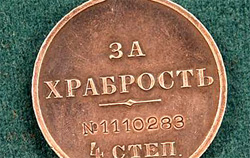
How did I become so fearless?

During the glorious era when the Socialist Party of Serbia (SPS) and the Yugoslav Left (JUL) were in their prime (although the SPS is a shining star even today), I had a chance to read childhood memories of Dr Bojic who, apparently, had to face wolves while going to school each day on a snow-covered road. "Therefore, I became quite fearless in my childhood!", he said. I remember this sentence very well – despite my otherwise unreliable memory – and the time has come to tell my readers how I became quite fearless myself as a grown-up, which is arguably an even bigger achievement.
The story also explains how I turned to be insusceptible to corruption during all these years.
While working for the "Economic Policy" ("Ekonomska Politika") magazine, I was advised by my editor, Milutin Mitrovic Dziva (who is now in Trieste) not to be biased in favor of the state, although at the time the state was in many ways better than the current one. At the time, I became familiar with Brecht's verse: "Let everyone speak about their own disgrace / I will talk about mine". These two principles became the two pillars of my ethics, although it could be better if there were four of them, like in our foreign policy.
My first antiwar move consisted of words spoken in the programme of Radio-Television Belgrade (RTB), which was yet to develop into its latter form. The three of us from the band "LOLA" opposed the approaching war. Truth be told, we did it because our musical performances in Slavonia, Istria, Dubrovnik and Sarajevo used to bring us a substantial amount of money, as well as a reasonable amount of fame. My first antiwar, antipresidential and anti-political party articles were published by the Vreme magazine. The said political party was, of course, the SPS, which was the legal-illegal successor to the Communist Party of Yugoslavia (SKJ). At the time, I had no idea whether my articles would annoy the President of Serbia, who had acquired an incredibly nice house in a surprisingly short period of time, while hundreds of thousands of people were going to lose their homes thanks mostly to him and Franjo Tudjman.
The reaction of the dictator was impossible to predict – in other words, I was not able to predict it. I was still not so fearless at the time and I published my antiwar articles in a para-literal, non-journalistic form, hoping (it was a completely naive and silly hope, which I realize now) that somehow I would be able to defend myself in court if I ever got accused of jeopardizing the untested fighting morale of citizens. However, the regime failed to direct a single threat or a warning at me. My then mother-in-law told me: "He will simply mobilize you!" Shame on him, I thought, for sending a coward and a pacifist to the front lines! However, it turned out that there were more than enough members of the army and paramilitary units, as well as volunteers. Unpunished and unmobilized, I felt like the German poet whose books were not burned by the fascists, which prompted him to wonder how it was possible – did he not always tell the truth?!
Naturally, my acquired fearlessness was later aimed at Kostunica and Tadic as well: if you punish me for my continued impertinence you will be perceived as worse than Slobodan Milosevic, who was more powerful and perhaps more inclined to ignore an annoying scribe. During Tadic's rule, I was removed from the programme of a TV station that was sympathetic towards his advisers, and I lost a gig at a birthday party in "Radmilovac" where I was pronounced persona non grata. The regime did nothing more than that to punish me. However, at the same time, since the regime did not do anything to try to appease me, I became incorruptible: who knows what might have happened if the City Assembly had decided to give me an apartment of my own, so that I could protect the interest of the public by writing from my own house! Had I been offered by the President to assist UNESCO in protecting our cultural heritage and our beloved identity, or had I been appointed a counselor for avoidance of verbal gaffes or invited to travel with him around the world, perhaps I would have proved myself more than cooperative. However, as it turned out, the regime and I have kept a distance from each other.
As it should be.
Ljubomir Zivkov
MC Newsletter,
November 4, 2011
View all comments (0) Leave a comment
Published comments contain opinions that are not the opinions of Media Center. Responsibility for the content of messages and their accuracy lies on the website users who posted them.
 |
| The content of this article does not necessarily reflect the view of the Media Center. The author bear full responsibility for the content of the text. |





